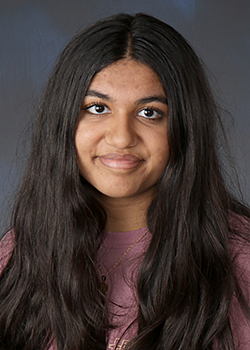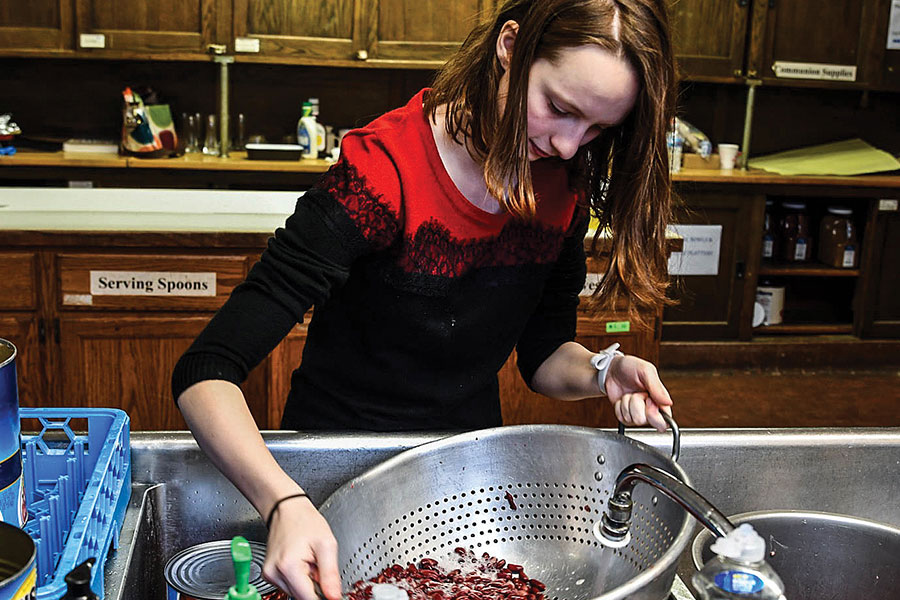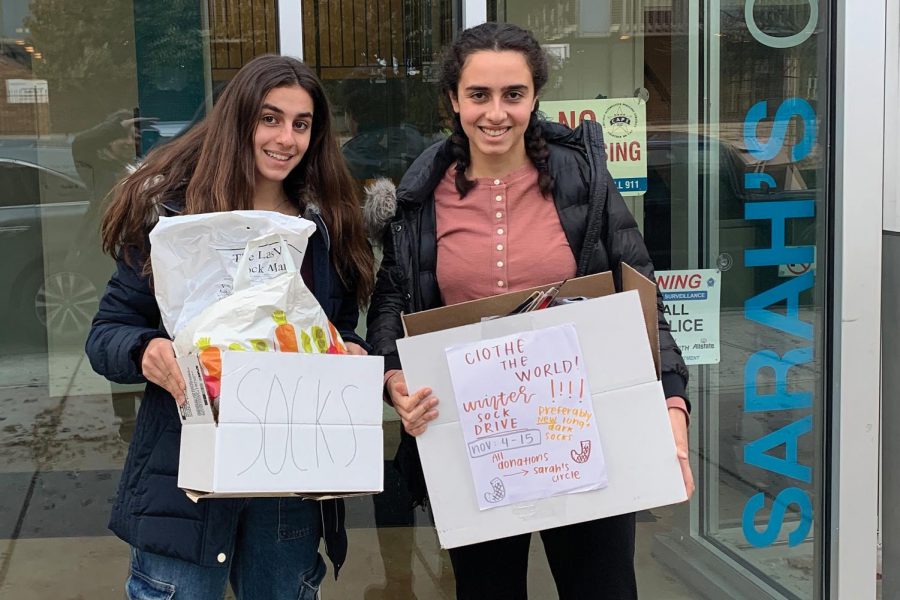Understanding the need: With clubs, churches, service sites, students volunteer to help in communities
December 13, 2019
“I felt like I could make the biggest impact working with them and forming relationships with these families” Sana’a Imami, a junior, said describing why she chose to work with the Hyde Park Refugee Project.
Students across America spend time volunteering after school, whether tutoring children, cleaning shelter homes, weeding community gardens or other helpful projects.
Though it’s usually clear what the community gets out of volunteer work, what the volunteers gain is not always apparent.
At the beginning of every month, Jane Barnard, sophomore, will make chili for the Hyde Park Food Pantry with her family and members of her church.
“It’s always very busy and there are a lot of different smells and sounds all around me,” Jane said. She’s been volunteering their with her family since she was about 7, so by now she’s assigned herself the role of opening cans of tomatoes.

Once a week, Sana’a helps two sisters, Ruha, a first grader, and Heva, a third grader, finish their homework after school. Additionally, she’ll usually try to explain or translate forms or letters sent home from school for the parents.
“I’m glad that I can help them in a greater capacity than just helping the girls with homework. I feel like I’m getting to know the family a lot better by talking to everyone,” Sana’a said.
Sana’a loves working with kids, so she knew she wanted to work with the HPRP when she learned she could help refugee kids.
“Tutoring is a way for me to not just help kids but also a way to establish a relationship with them and be another person they can reach out to whenever they need anything, even non-academics,” Sana’a added.
Because Jane’s been working at the same food pantry for so long, she says she’s learned a lot about working in the kitchen with people and gained a lot of collaboration skills.
Jane said, “Even though it’s kind of monotonous, right, I’m just opening cans, it’s good because I’m getting things done and I know it’s for a good cause.”
Clubs contribute to community
SERVICE SUPERSTARS. Sisters Adrianna and Alexandra Nehme drop sock donations from U-High club Clothe the World at Sarah’s Circle, a nonprofit that supports women in need in Chicago.
With winter break approaching, U-High’s clubs have taken the idea of the season of giving to heart and are volunteering, hosting fundraisers and helping in the community.
The Jewish Students’ Association hosted its annual toy drive, donating to La Rabida Children’s Hospital the week of Nov. 18.
“It is something we do every year, but that doesn’t make it any less meaningful,” JSA President Nathan Applebaum said. “We do this because, particularly now, it’s important to help in the community.”
But JSA isn’t the only club completing annual traditions for the season of giving.
Refugee Awareness Club ran a booth at Lab’s Holiday Bazaar during the week of Dec. 2 to fundraise for Hyde Park Refugee Project. According to RAC co-president Claire Duncan, this year, the Holiday Bizarre was more student focused.
“Many people coming from places such as Syria haven’t experienced winter like we have,” Claire said, “So our donations will likely go toward coats and things like that.”
Also focusing on the idea of warm clothing, Clothe the World hosted a sock drive Nov. 4-15 to donate to Sarah’s Circle, an organization which provides a variety of services for homeless and at-risk women during the day.
“I could tell you how brutal Chicago winters are and that’s with all of our privilege,” Vice President Kara Xu said. “Now think about that winter without heat or a coat or any number of things to keep you warm. That’s why it’s important to recognize and help in our communities, especially now.”
Another example of a club volunteering in the community is REACT. Throughout the fall, the club has organized lunch packings and is volunteering at Ronald McDonald House Dec. 14.
For President Kepler Boonstra, volunteering in Chicago during the winter is particularly important. He says, during the fall the club does more fun things, but as temperatures drop, they get into gear and try to make their volunteering as frequent as they can. Each of these clubs and many more throughout U-High are embracing the season of giving to motivate volunteering and helping in the community.
“Around the holidays, we need to notice our privilege,” Kepler said, “As Lab community members move from there to helping others.”
Admissions recognizes need among Lab students
There’s a stereotype around the city that everyone at Lab has money, that everyone who attends has the financial means to go on extravagant vacations, ride around in expensive cars, and constantly explore Chicago’s finest restaurants — all in addition to the costs of a Lab education.
A recent video on the popular social media app TikTok showed a user lip syncing to a monologue describing affluence and college admissions while superimposing names of high schools in the Chicago area, generalizing about the demographics of each school. When Latin School is mentioned, the user says, “Well, I’m rich, so…” and when Lab is mentioned, the user says “What? I’m rich, too, bro!”
However, according to Lab’s website, approximately 80% of the student body receives some type of assistance toward tuition, including financial aid packages, scholarships, as well as tuition remission for children of Lab employees or other University of Chicago employees. Yet many families still have financial need, and a new study is exploring it.
“Those of us in the admission office have been mindful of [costs outside tuition] for some time. We know that costs go beyond tuition,” Kerry Tulson, assistant director of admission and financial aid, said, explaining Lab’s current inability to assist with paying for any other costs than tuition.
This leaves families responsible for the costs of books, lunches, overnight field trips, extended-day care for younger students, P.E. clothes and more. At present, the only additional resource for families is communication with the financial aid office via the office’s email. Irene Reed, director of admissions and financial aid, says that the needs that are brought to the attention of the office this way are not always available to be met.
New efforts to support every student from any family financial situation have begun with the recently released strategic framework, which aims to ensure a healthy and inclusive community. To do so, a school-wide study is being done to examine all the non-tuition costs at Lab. The study will audit the bills families pay through FACTS and for MyBookstore and collaborate with the administrative teams for all schools at Lab.
Ms. Tulson reports that only after the study has finished will the process of raising funds for students and families begin to offer Lab’s education to a more socio-economically diverse range of students.
What you can do
Volunteer at your sophomore service site:
Every junior and senior has already established a relationship with local organizations that they worked with only a year or two ago. If you don’t want to go back to your service site, or it’s far away, there are plenty in the neighborhood that are always looking for volunteers, like Strive Tutoring and the Hyde Park Refugee Project.
Participate in student service projects :
The Wildlife Conservation Club hosted its first beach clean-up on Friday Dec. 6, where members picked up litter from the 57th Street Beach. Students can join in future beach by contacting senior Joana Rose.
Donate to local shelters or participate in supply drives:
There are plenty of ways to give back right here at Lab. Food, clothing and other supply drives are often taking place, so keep an eye out for the donation boxes located in the U-High lobby. If a drive isn’t currently going on, take extra clothes to Encore Resale Clothing, located at 1553 E. Hyde Park Blvd, Goodwill or the Salvation Army.
Help with the little things:
If you see trash, pick it up. Perform a random act of kindness and make someone’s day better.

